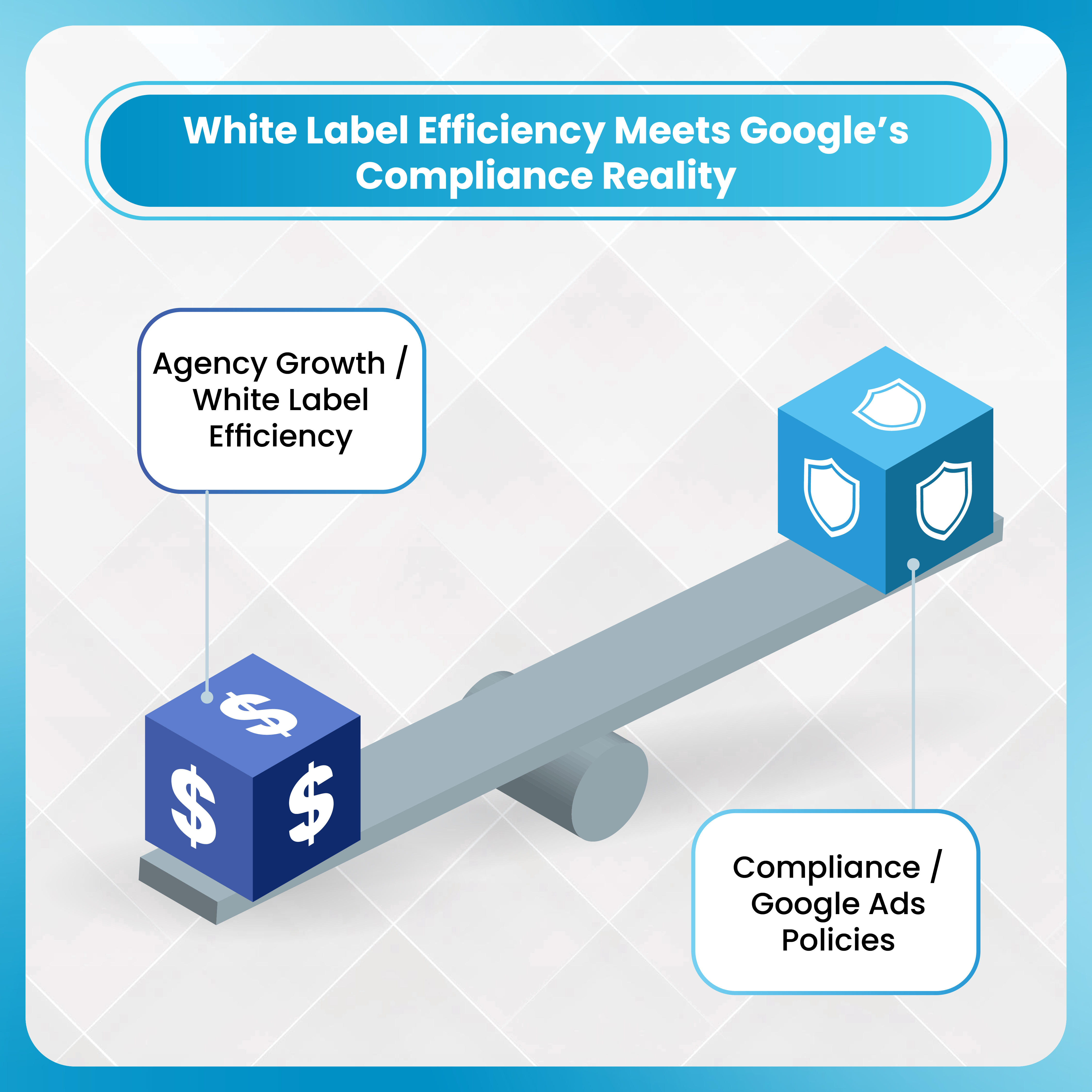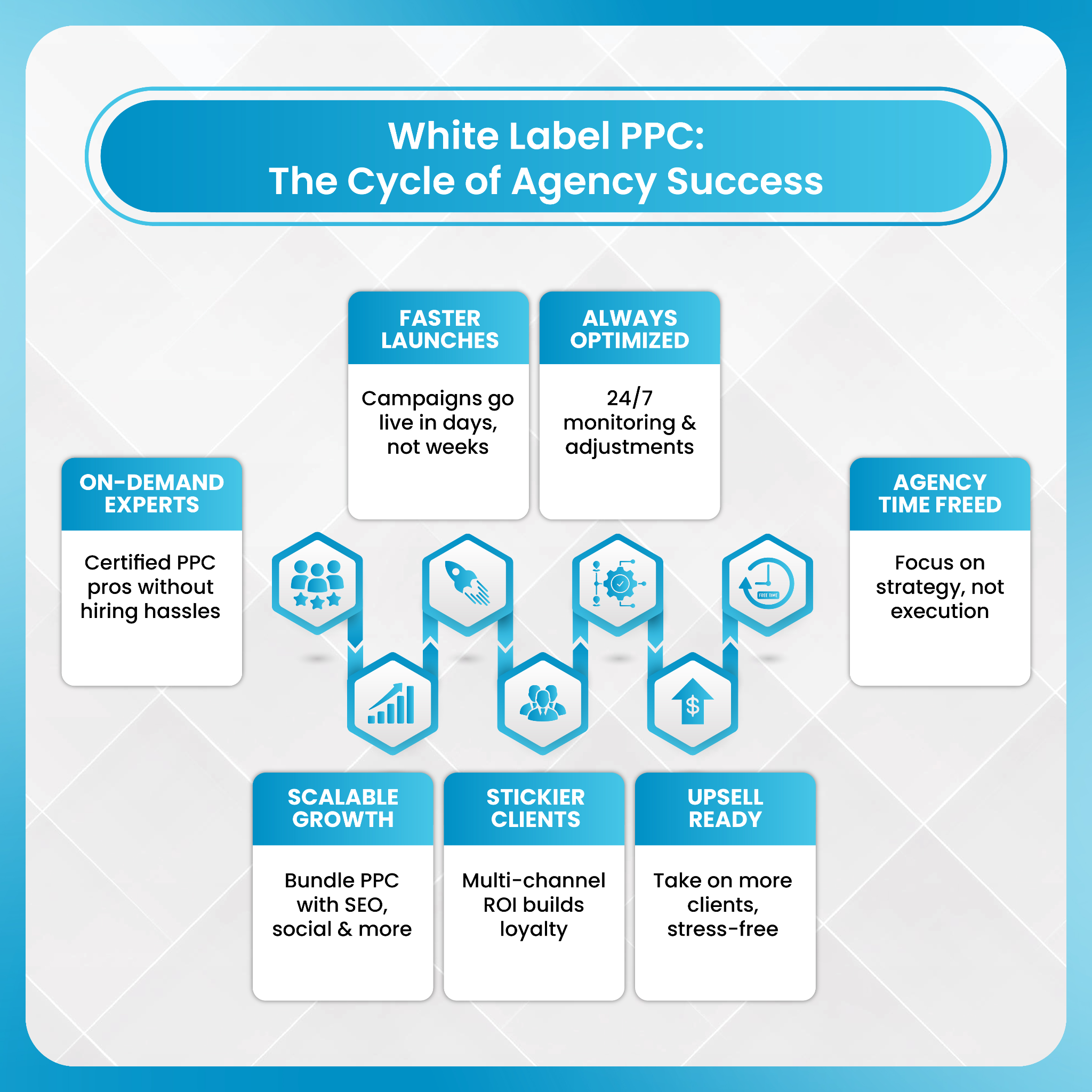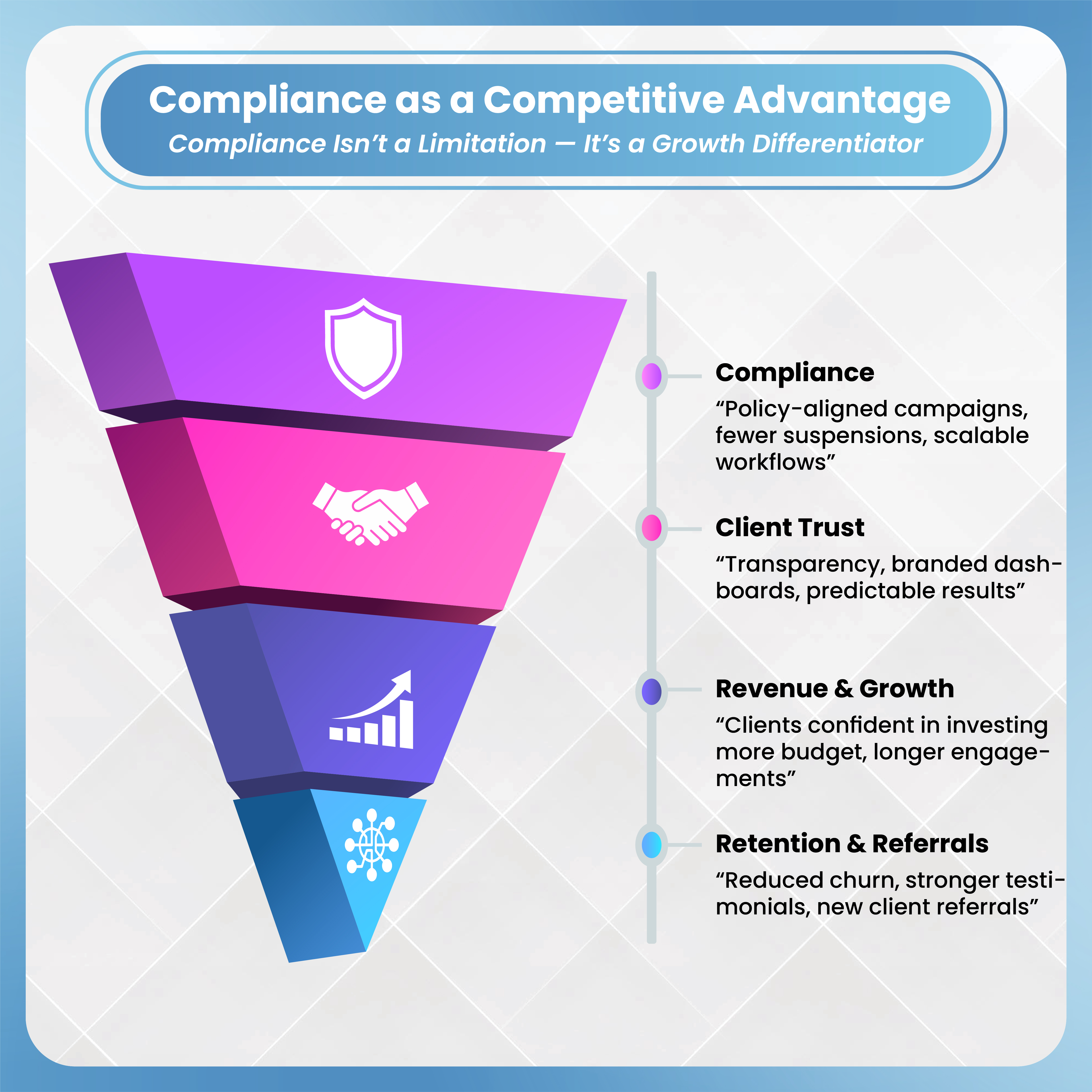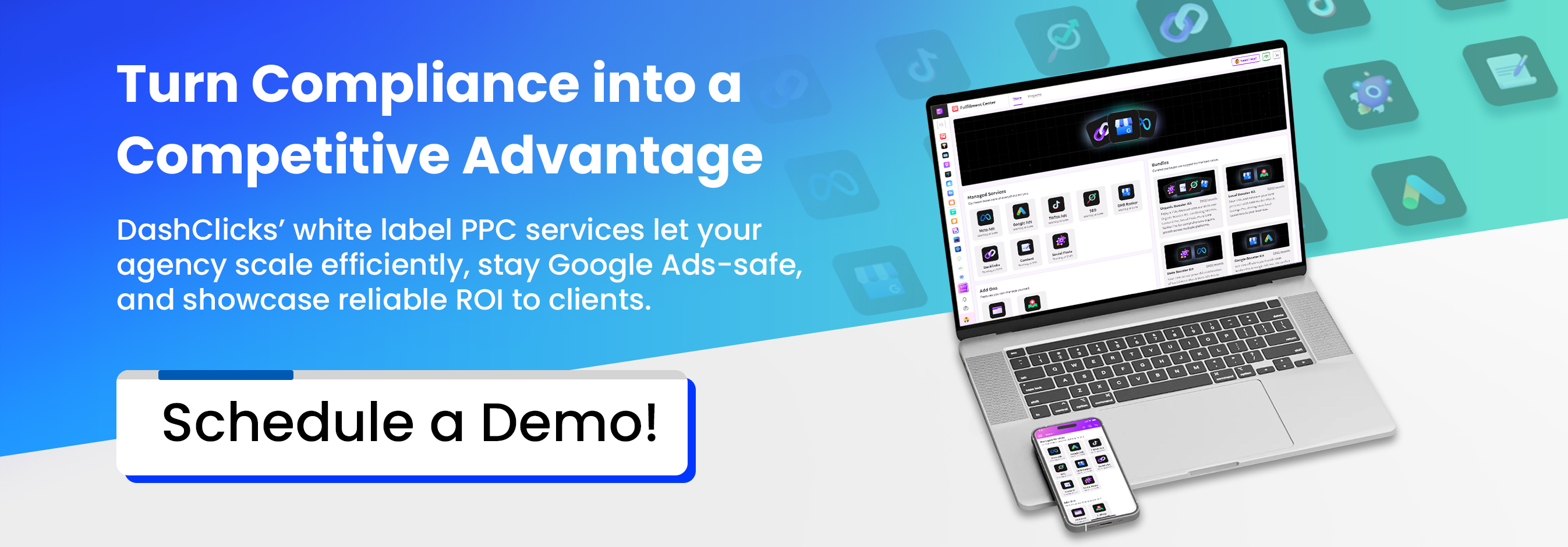White label services have revolutionized agency growth, but they've also introduced a critical blind spot that's causing Google Ads account suspensions at an alarming rate. Google suspended over 39.2 million advertiser accounts in 2024, marking a 200% increase from the previous year.
However, the explosion of Google Ads account suspensions tied to white label service models has become an underreported industry challenge.
The Algorithm Behind Suspensions: What Google’s AI Actually Looks For
To understand why suspensions occur so often in white label setups, agencies must grasp how Google’s compliance system works. Google’s AI doesn’t simply flag “bad ads.” It maps behavioral and structural patterns across accounts, domains, and payment networks to detect potential abuse.
Some of the top AI-driven signals include:
- Account Linkage Patterns: Shared IP addresses, payment profiles, or logins across multiple accounts.
- Landing Page Similarities: Duplicate content or cloned structures across client sites.
- Velocity Triggers: Sudden ad spending spikes or new domain launches.
- Policy Reuse Recognition: Ads that reuse creative or claim templates from previously suspended campaigns.
For white label PPC providers managing hundreds of accounts, these automated cross-signals can cause collateral suspensions — meaning compliant accounts can get penalized due to proximity to one flagged entity.
Understanding these signals is step one in reducing risk before they compound.
When White Label Efficiency Meets Google's Compliance Algorithms?
Your agency is thriving. White label PPC partnerships have allowed you to scale faster than ever, offering comprehensive digital marketing services without the overhead of building everything in-house. Your clients are getting results, your revenue is climbing, and your team can focus on what they do best.
Then the notification arrives: "Your Google Ads account has been suspended."
This scenario is playing out with increasing frequency across agencies that have embraced white label partnerships without understanding the hidden compliance risks they've inherited.

The White Label Compliance Gap: 5 Critical Risk Factors
1. Multiple Account Management Under Shared Infrastructure
Google's 2023 policy update reinforces the importance of managing all accounts with a high standard of compliance, and violations don't need to be identical to trigger suspensions across multiple accounts. When white label PPC providers manage campaigns for multiple agencies using shared systems, a policy violation in one account can trigger algorithmic flags across seemingly unrelated accounts.
Risk Factor: Managers who use the same credit card across multiple accounts can trigger Google to treat accounts as duplicate accounts and accuse them of circumventing policies.
2. Template-Based Campaign Structures That Trigger "Circumventing Systems" Flags
White label providers often use proven templates and frameworks to ensure consistent results across clients. However, reused content from previous campaigns or landing page templates from a flagged account can trigger Google's detection of potentially misleading practices.
Critical Insight: Google considers that you are trying to trick users and/or get around Google's systems, and it's not hard to unintentionally and unknowingly violate this policy.
3. Misrepresentation Risks in Franchise and Reseller Models
Franchises, affiliates, resellers, and service providers are at the highest risk under the new unacceptable business practices policy due to the complexity of their brand relationships and Google's enhanced algorithmic detection systems.
White label PPC services often serve businesses with complex relationships to parent brands, creating perfect conditions for misrepresentation violations.
4. Domain and Website Credibility Issues
Google's system often flags new domains or landing pages that look "too fresh" without sufficient content history. White label providers building new websites for multiple clients can inadvertently create patterns that trigger automated suspension algorithms.
5. Inconsistent Business Information Across Platforms
Google evaluates your entire user journey and reviews information from multiple accounts and third-party sources. Even compliant ads can trigger suspensions if landing pages or checkout flows violate unacceptable business practices guidelines.
When white label teams work across multiple platforms and accounts, maintaining consistent business information becomes challenging, creating compliance gaps that Google's algorithms are increasingly sophisticated at detecting.
How White Label PPC Partnerships Strengthen Google Ads Compliance
While white label services can create risks, strategic white label PPC partnerships can actually become a compliance advantage — if properly structured. Top-tier providers incorporate multi-layered safeguards designed to align with Google’s most recent advertiser behavior standards.
- Dedicated Compliance Frameworks: A best-in-class white label PPC agency builds campaigns using real-time compliance tracking tools, pre-ad approval checks, and historical violation databases. These systems ensure that ad copy, claims, and creatives stay within Google’s dynamic policy updates.
- Centralized Monitoring Across Accounts: Rather than triggering false linkages, compliant partners segment all accounts using unique billing profiles, domain verification, and IP segregation. This ensures cross-account independence while still allowing for unified performance tracking.
- Continuous Policy Synchronization: Reputable white label PPC agencies monitor Google’s policy documentation daily and retrain their internal ad ops teams on every update — particularly around misrepresentation, financial claims, and circumventing systems.
- Data Privacy and Transparency: Google’s current emphasis on user privacy (especially post-2024 data handling updates) means advertisers must maintain transparent data usage. Trusted white label providers build compliance around these frameworks, ensuring all data collection and conversion tracking align with privacy-first standards.
- Built-In Appeal Support: Some white label PPC partners even maintain direct relationships with Google representatives or policy specialists — allowing faster case review during suspension appeals.
In short, a compliance-conscious white label PPC relationship transforms a potential liability into an operational asset — reducing downtime, preserving ad credibility, and reinforcing agency reputation.

The Financial Impact: More Than Just Paused Campaigns
The consequences extend far beyond temporary advertising interruptions:
- Immediate Revenue Loss: Suspended accounts cannot run any ads, creating instant cash flow problems.
- Client Relationship Damage: Explaining suspension issues to clients while protecting white label partnerships creates trust issues.
- Opportunity Cost: Retaining existing clients costs five times less than acquiring new ones, but suspensions accelerate churn.
The Resolution Challenge: Why DIY Appeals Often Fail?
Most agencies attempt to resolve suspensions internally, but this approach faces several critical challenges:
- Limited Visibility: White label providers may not share complete campaign details needed for effective appeals.
- Technical Knowledge Gaps: Some individuals advertise on gig platforms such as Fiverr and Upwork, claiming to help get Google Ads accounts unsuspended, but we've seen some suspension problems compounded by "experts" from these platforms who have tried and failed.
- Policy Complexity: Google won't tell you exactly what the problem is, making it incredibly hard to identify and fix the actual violation.
Recovery Roadmaps: Tiered Action Plan Based on Suspension Type
Every Google Ads suspension falls into one of three categories — and each requires a distinct recovery protocol:
- Ad-Level Violations: Focus on modifying creative or landing page content. Avoid re-uploading near-identical versions, which triggers circumvention flags.
- Account-Level Suspensions: Conduct a full compliance audit. Document ownership, business verification, and billing methods before filing an appeal.
- Cross-Account or Manager Suspensions: These are the hardest to fix. The solution involves unlinking dependent accounts, migrating to clean infrastructure, and re-establishing trust via verified business documentation.
Agencies offering PPC services alongside their core offerings report 30–40% higher client retention rates and significantly larger average client values.

Building Suspension-Resistant White Label Partnerships
Partner Due Diligence Framework
Before engaging any white label provider, implement this compliance assessment:
- Infrastructure Audit: Verify how they manage multiple client accounts and prevent cross-contamination.
- Compliance History: Request detailed information about any previous client suspensions and resolution outcomes.
- Template Policies: Understand how they prevent reused content from triggering circumventing systems violations.
- Business Model Clarity: Ensure their service delivery model aligns with Google's transparency requirements.
Ongoing Monitoring Protocols
- Regular Compliance Audits: Quality white label Google Ads services provide comprehensive reporting that you can confidently share with clients, including keyword rankings, traffic analytics, backlink profiles, and technical audit results.
- Account Segregation: Implement clear boundaries between white label provider access and your direct client management.
- Policy Update Communication: Establish protocols for sharing Google policy changes and ensuring rapid implementation across all campaigns.
Emergency Response Preparation
Despite the best prevention efforts, suspensions can still occur. Agencies need specialized expertise for resolution because every Google Ads suspension is unique and requires a nuanced understanding of both the technical violation and the underlying business model.
When facing complex suspension scenarios, particularly those involving multiple accounts or circumventing systems violations, partnering with specialists like StubGroup becomes critical. Their expertise in navigating Google's appeal process and understanding the intersection of business models with compliance requirements can mean the difference between rapid reinstatement and permanent account loss.
The Future of Compliant White Label Partnerships
AI integration transforms white label delivery, and agencies must ensure their AI partners comply with privacy regulations and provide clear data handling policies. As automation increases, so does the need for sophisticated compliance monitoring.
The most successful agencies will be those that proactively address these risks rather than reactively dealing with suspensions. This means:
- Choosing Partners Wisely: Your reseller will be an extension of your team—so it's critical to choose wisely by looking for proven track records, transparency, and clear pricing models.
- Maintaining Oversight: Regularly audit the deliverables your white label team produces using live dashboards and transparent task tracking.
- Building Internal Expertise: Understanding Google's policies and suspension triggers, even when outsourcing execution.
Scaling Google Ads campaigns through white label partnerships is one of the most effective growth strategies for digital marketing agencies — but it comes with hidden compliance risks that can lead to account suspensions. DashClicks’ white label PPC services combine expert campaign management, branded reporting dashboards, and compliance-focused workflows to protect your client accounts while driving measurable results.
With structured processes, multi-account oversight, and proactive policy monitoring, your agency can confidently deliver high-performing campaigns at scale. With DashClicks, retain clients, reduce churn, and turn compliance into a competitive advantage — all while keeping your operational overhead low.
AI-Driven Compliance Monitoring: The Future of Safe Scaling
Modern compliance is no longer manual. Leading white label PPC ecosystems now integrate AI-driven compliance scoring — analyzing campaign text, ad assets, and URL structures in real-time for potential violations.
Platforms like DashClicks and Adverity enable agencies to:
- Detect flagged terms before submission.
- Monitor account trust scores across all clients.
- Auto-sync campaign metadata with policy changelogs.
These systems transform compliance into a predictive shield — alerting teams to risks before they cause suspensions. Agencies leveraging AI-based compliance tools report up to 45% fewer ad disapprovals (Source: Adverity Compliance Insights 2024).
Take Action Before It's Too Late
White label partnerships remain one of the most effective scaling strategies for digital agencies. DashClicks offers a complete package of white label PPC services, including a client reporting dashboard that is customized to showcase your agency's brand, demonstrating how proper implementation can drive growth while maintaining compliance.
The key is approaching these partnerships with full awareness of the compliance risks and implementing robust safeguards from day one.
Immediate Next Steps:
- Audit Current Partnerships: Review your existing white label relationships for potential compliance gaps.
- Implement Monitoring Systems: Establish ongoing oversight of white label campaign performance and compliance.
- Develop Response Protocols: Create clear procedures for handling suspension notifications.
- Build Expert Networks: Identify specialists who can assist with complex suspension scenarios.
The agencies that thrive in the next phase of digital marketing evolution will be those that successfully balance the efficiency of white label partnerships with the rigor of compliance management. The question isn't whether to use white label services—it's how to use them safely.
Don't wait for a suspension notification to discover the gaps in your compliance strategy. The cost of prevention is always lower than the price of resolution.



.svg)

.svg)
.svg)
.svg)
.svg)
.svg)

.svg)




.svg)
.svg)
.svg)
.svg)
.svg)